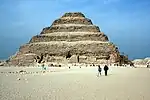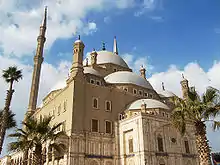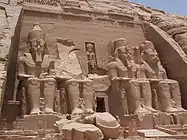| This article is part of a series on |
| Life in Egypt |
|---|
 |
| Culture |
| Society |
| Politics |
| Economy |
|
Egypt portal |
Tourism is one of the leading sources of income, crucial to Egypt's economy. At its peak in 2010, the sector employed about 12% of workforce of Egypt,[1] serving approximately 14.7 million visitors to Egypt, and providing revenues of nearly $12.5 billion [2] as well as contributing more than 11% of GDP and 14.4% of foreign currency revenues.[3]
History

The number of tourists in Egypt stood at 0.1 million in 1952. Tourism became an important sector of the economy from 1975 onwards, as Egypt eased visa restrictions for almost all European and North American countries and established embassies in new countries like Austria, Netherlands, Denmark and Finland. In 1976, tourism was a focal point of the Five Year Plan of the Government, where 12% of the budget was allocated to upgrading state-owned hotels, establishing a loan fund for private hotels, and upgrading infrastructure (including road, rail, and air connectivity) for major tourist centers along with the coastal areas. In 1979, tourism experts and advisors were brought in from Turkey and several new colleges were established with Turkish help between 1979 and 1981, to teach diploma courses in hospitality and tourism management. The tourist inflow increased to 1.8 million in 1981 and then to 5.5 million in 2000. Tourists arrivals reached a pinnacle in 2010 by reaching 14.7 million visitors.[2][4] Revenues from tourism reached the highest point at $12.6 billion in the fiscal year 2018–2019. In the year 2020, tourism-related revenues dropped by nearly 70% to $4 billion. Citing the Tourism and Antiquities Minister Khaled El-Enany, Egypt's tourist arrivals plunged to 3.5 million in 2020.[5] In February 2022, the managing director of the International Monetary Fund (IMF), Kristalina Georgieva in a publication disclosed that Egypt's tourism sector was the biggest loser of the Coronavirus Outbreak.[6]
Impact of revolutions on tourism
-edit2.jpg.webp)
During the Egyptian Revolution of 2011, the number of visitors plummeted by over 37% that year falling from 14 million in 2010 to 9 million by the end of 2011. This has impacted a diverse range of businesses directly or indirectly dependent on tourism, from travel accommodation and tourist attractions to car rental and air transportation, as well as health and wellness industries. Tour operators offering heavy discounts to encourage tourists back have been somewhat successful at the Red Sea resorts where prices remain lower compared to 2011.[7]
In the first half of 2014, the number of tourists further declined by 25% as compared with the same period in 2013, while revenues shrank by 25% as well.[3][8]
In 2013, Egypt ranked 85th as the world's best country in terms of tourism and traveling, falling ten places from its ranking of 75 in 2011. However, it regained some ground in the 2017 rankings being rated 75th overall.[9][10] As of the 2019 rankings, Egypt ranks 65th overall.[11]
Israelis can cross into Egypt for 14 days without a visa at certain areas near Taba and they come to enjoy areas on the Red Sea Riviera.[12] In 2017, the first group of Israelis visited the more popular tourist attractions with the aid of strong security. It had been 18 months since any group of Israeli tourists had visited Egypt.[13]
In 2017, Bloomberg said Egypt has "shed its years of social and political unrest" and made the top 20 list of 2017 travel destinations.[14] The latest United Nations World Tourism Organization (UNWTO) has revealed that Egypt is one of the world's fast-growing tourist destination. In 2017, the number rose to 8 million tourists compared to the previous year which was about 5.26 million.[15]
Security

The tasks of tourism security in Egypt are carried out by the General Administration of Tourism and Antiquities Police, which is responsible for developing plans to secure tourists and protect antiquities, museums, and cultural facilities within the framework of the general plan of the Egyptian Ministry of Interior. In order to fulfill the components of that mission, the administration secures the movement of tourist groups by closely monitoring or accompanying tour groups, securing tourist and archaeological facilities and sites, securing tourist and Nile cruises, combating tourism crimes that tourists may be exposed to and archaeological crimes, following-up with tourism companies and shops and receiving notifications of tourists' complaints against them, providing Police rescue vehicles that ensure a security presence in all tourist cities, and addressing cases of trespassing. Given Egypt's Middle Eastern and African status, and its location in the midst of a regional conflict zone, it has been subject to several unfortunate terrorist incidents, the most famous of which is the Luxor incident in 1997, the Cairo incident in 2005, the Sharm el-Sheikh incident in 2005, the Dahab incident in 2006 and the downing of Metrojet Flight 9268.[16][17] All these incidents combined have negatively affected the tourism sector. However, the tourism sector returned and regained its activity quickly during the 2010s and especially after the most recent 2017 Hurghada attack to achieve high annual tourism revenues.[18]
Statistics
| Year | Total number of tourists, million |
Total number of nights, million |
|---|---|---|
| 1995 | 2.9 | |
| 2000 | 5.2 | |
| 2005 | 8.2 | |
| 2010 | 14.7 | 147.4 |
| 2011 | 9.8 | 114.2 |
| 2012 | 11.5 | 137.8 |
| 2013 | 9.5 | 94.4 |
| 2014 | 9.9 | 97.3 |
| 2015 | 9.3 | 84.1 |
| 2016 | 5.4 | 37.2 |
| 2017 | 8.9 | |
| 2018 | 11.3 | |
| 2019 | 13.026[21] | 136 |
| 2020 | 3.5[22] |
| Year | Total revenue, billion USD |
|---|---|
| 1995 | 3.0 |
| 2000 | 4.7 |
| 2005 | 7.2 |
| 2010 | 12.5 |
| 2011 | 8.7 |
| 2012 | 9.9 |
| 2013 | 6.0 |
| 2014 | 7.2 |
| 2015-2016 | 3.3 |
| 2016-2017 | 4.4 |
| 2017-2018 | 9.8 |
| 2018-2019 | 12.6 |
| 2020 | 4 |
Most tourists arriving to Egypt in 2019 came from the following territories:[23]
| Rank | territory | Number of tourists |
|---|---|---|
| 1 | Europe | 8,400,000 |
| 2 | Middle East | 2,400,000 |
| 3 | Africa | 911,000 |
| 4 | Asia and Oceania | 688,000 |
| 5 | Americas | 548,000 |
Most tourists in Egypt came from the following countries
| Rank | Country | 2018 | 2017 | 2016 | 2015 | 2014 |
|---|---|---|---|---|---|---|
| 1 | 1,707,400 | 912,000 | 653,900 | 1,020,900 | 877,220 | |
| 2 | 1,174,200 | 797,300 | 425,000 | 363,600 | 446,500 | |
| 3 | 909,100 | 669,600 | 507,300 | 433,100 | 350,100 | |
| 4 | 435,000 | 319,400 | 231,300 | 869,500 | 905,700 | |
| 5 | 422,000 | 225,100 | 131,500 | 332,900 | 400,400 | |
| 6 | 410,700 | 336,400 | 282,800 | 268,500 | 211,000 | |
| 7 | 405,400 | 235,000 | 234,700 | 161,000 | 140,400 | |
| 8 | 303,700 | 177,400 | 67,200 | 207,300 | 302,800 | |
| 9 | 287,800 | 226,400 | 184,300 | 188,700 | 154,600 | |
| 10 | 274,000 | 162,500 | 54,000 | 149,600 | 166,600 | |
| 11 | 268,600 | 203,500 | 90,400 | 134,100 | 125,600 | |
| 12 | 234,700 | 287,300 | 179,500 | 115,200 | 61,700 | |
| 13 | 217,500 | 150,200 | 101,100 | 136,600 | 144,800 | |
| 14 | 208,300 | 211,800 | 179,800 | 177,100 | 170,800 | |
| 15 | 189,700 | 151,800 | 82,800 | 150,400 | 126,800 | |
| 16 | 164,700 | 122,900 | 67,500 | 144,800 | 130,500 | |
| 17 | 164,500 | 176,600 | 150,400 | 139,700 | 120,900 | |
| 18 | 145,600 | 94,000 | 53,900 | 2,389,900 | 3,139,000 | |
| 19 | 136,900 | 95,700 | 50,600 | 92,000 | 74,200 | |
| 20 | 136,000 | 73,900 | 68,300 | 62,200 | 114,100 | |
| Total Foreigner | 11,300,000 | 8,900,000 | 5,400,000 | 9,300,000 | 9,900,000 |

In 2020, Egypt's tourism revenue dropped by about 70% to US$4 billion, reducing tourist arrivals to 3.5 million from 13.1 million in 2019. As stated by the Central Bank of Egypt (CBE), Egypt's revenues from tourism for the months of 2020-2021 fiscal year plunged by 67.4%.[24] According to Khaled al-Anani, the average number of tourists who visited Egypt in April 2021 is nearly half of the average monthly number of 2019.[25]
The highest number of tourist arrivals to Egypt in 2019 (before the international Coronavirus pandemic) was from Germany (2.5 million arrivals) followed by Ukraine (1.5 million), Saudi Arabia (1.4 million) and Libya (0.75 million).[26]
Major attractions

Major tourist destinations include the millennia-old monuments in the Nile Valley. Principal among them are the Pyramids and Great Sphinx at Giza, the Abu Simbel temples south of Aswan and the Karnak Temple Complex and Valley of the Kings near Luxor. Attractions in Cairo include the Cairo Museum and the Mosque of Muhammad Ali Pasha. The coast of the Sinai Peninsula has well-visited seaside resorts, in addition to Hurghada City on the Red Sea coast and the Famous El Gouna Resort 25 km Hurghada.[27]
- Giza, 20 km southwest of Cairo, has several remains from the 26th century BC such as temples and monuments to pharaohs including the Great Sphinx, and the Great Pyramids of Giza.
- Saqqara, 30 km south of Cairo is a vast, ancient burial ground which served as the necropolis for the Ancient Egyptian capital of Memphis. It features numerous pyramids, including the world's oldest standing step pyramid, as well as a number of mastabas.
- Luxor, about 500 km south of Cairo, is the site of the ancient city of Thebes. It includes the ruins of the temple complexes at Karnak and Luxor, which stand within the modern city. On the opposite side of the Nile River lie the monuments, temples and tombs on the West Bank Necropolis, which include the Valley of the Kings and Valley of the Queens.

- Abu Simbel, about 850 km south of Cairo (near the Egypt–Sudan border) is an archaeological site comprising two massive rock temples originally carved out of a mountainside during the reign of Pharaoh Ramesses II (13th century BC). The complex was relocated in its entirety in the 1960s to avoid being submerged during the creation of Lake Nasser. They are now situated on an artificial hill made from a domed structure high above the Aswan High Dam reservoir.
- Alexandria is a main summer resort, due to its beaches, ancient history and Museums, especially the Bibliotheca Alexandrina, a modern project based on reviving the ancient Library of Alexandria.
- Sinai Peninsula- Sinai has the beach resorts of Sharm el-Sheikh, Dahab, Nuweiba and Taba as well as locations mentioned in the Bible such as Mount Sinai ("Jabal Musa"). Saint Catherine's Monastery may be the oldest working Christian monastery in the world.
- Ain Sukhna, about 110 km east of Cairo has a number of beach resorts.
- Assiut:in south of Egypt has historic buildings from the time of the pharaohs and ancient mosques.
- Hurghada and El Gouna resort on the Red Sea Coast, 25 km from Hurghada International Airport, are both famous for their beaches, snorkeling and diving, and El Gouna is famous for its nightlife.
Ancient Egypt
The civilization of Ancient Egypt left many monuments and temples that have become attractions for modern-day visitors to Egypt. These include:
Pyramids: there are more than 70 pyramids along the Nile, with the three pyramids of Giza being the best-known. The Sphinx, a lion-bodied guard, stands beside pyramids in Giza. The pyramids were built more than 4,000 years ago in the eras of Kings Cheops, Kefren and Mykerinos. These three kings' bodies were buried within the pyramids. The pyramid of Cheops is the largest at 145 meters in height, and is referred to as the Great Pyramid.
Saqqara Complex: The vast necropolis of Saqqara including Memphis is located 24 kilometers south of central Cairo. Memphis was founded in about 3000 BC by Menes, along with 11 other pyramids. Memphis was the administrative capital of ancient Egypt. Saqqara has Zoser's funerary complex, Mereruka's tomb and the Serapeum, a complex of subterranean vaults that housed mummified Apis bulls, some in gargantuan granite coffins.

Valley of the Kings in Thebes: Due to theft from tombs within pyramids, 26 pharaohs of the eighteenth to twentieth dynasties including Tutankhamun, Ramses the Great and Tuthmosis III had their tombs carved into the rock of the Valley of Kings. There are further tombs in the Valley of the Queens.
Nile cruises

Cruises are offered along the Nile ranging from short tours between Luxor and Aswan to longer cruises that include the northern town of Dendera.
In the past, it used to work all the way from Cairo to Aswan for more than two weeks, but due to the development of the Nile, they stopped doing Nile Cruises all the way from Cairo, and it is now working from Luxor to Aswan.
Nile Cruises History
Nile Cruising started during the early 19th century when Ibrahim Pasha of Egypt made his journey up and down the Nile.[28] The late 19th century saw the publication of a novel written by a Miss Edwards. The novel, titled The Nile and its Monuments, details the various historical sites see along the river during Nile cruises.[29]

Many cruises are aboard a larger vessel that functions as a floating hotel. Other Nile trips can be on a felucca, a traditional sailboat, on which overnight journeys may require passengers to sleep in the open air on deck and the sailors to double as cooks.
Between October and mid April the daytime temperatures are cooler and the Nile's locks are open. From around the middle of April locks on the river are closed in order to manage water levels, requiring passengers to disembark on one side of the lock and transfer to another boat on the other side.
Transportation
Passports and visas are required of foreign visitors except natives of several Middle Eastern countries. Travelers native to most of Africa must have proof of cholera and yellow fever vaccination.[27]
Airports
There are nine international airports in Egypt that serve all of the county's major cities including Cairo International Airport and Taba International Airport.[30]
Cairo International Airport is the main gateway to Egypt and is located about 15 miles northeast of the city in northern Egypt. Cairo's three terminals receive flights from all major world cities including those in North America, Europe, Asia and Africa. Central Cairo is accessible from the airport by bus, taxi, or limousine.
Located in central Egypt, Luxor International Airport serves the Nile Valley and acts as a gateway to tourist destinations of the region. It has connections from the UK, Germany, Russia, France, Italy, and Turkey. Two terminals serve international and domestic flights, with a number of Egyptian carriers including Air Cairo and Egypt Air operating from the airport. The airport is located close to the city centre and taxis, limos and regular buses are available for transfers into the city.
Railways


Egyptian Railways is the backbone of passenger transportation in Egypt, with 800 million passenger miles annually.[31]
Air-conditioned passenger trains usually have 1st and 2nd class service, while trains without air condition will have 2nd and 3rd class. Most of the network connects the densely populated area of the Nile delta with Cairo and Alexandria as hubs.
The Alexandria-Cairo-Luxor-Aswan link is served daily in both directions by air-conditioned sleeper trains of Abela Egypt. This service is especially attractive to tourists who can spend the night on the train as it covers the stretch between Cairo and Luxor. A luxury express train also connects Cairo with Marsa Matruh towards the Egypt–Libya border.
Egyptian currency
The currency of Egypt is the Egyptian pound (LE or ج.م – abbreviated to "LE" or "L.E." – livre égyptienne, "Egyptian pound" in French). The pound is divided into 100 piastres. The approximate official exchange rate for US$1 is LE 15.75 as of April 2020. The Central Bank of Egypt controls the circulation of currency. As of May 2009, the currency notes in circulation have denominations of LE 200, LE 100, LE 50, LE 20, LE 10, LE 5, LE 1 and 50 PT. and 25 PT.[32]
There is no limit on the amount of currency which the visitors may bring to Egypt, however, they must declare the currency and amount upon arrival and departure with bank receipts. There may be restrictions on the amount of currency that can be taken outside of Egypt, and generally it should not exceed LE 5,000.[33][34]
Climate
Peak tourist season in Egypt runs from mid October to May, during winter and spring. From May until October daytime temperatures are relatively high, especially in Luxor and the southern parts of the country.
Egypt is one of the hottest and sunniest countries in the world. With the exception of a strip along the Mediterranean coast, Egypt has a desert climate, being entirely within the Sahara. The Mediterranean coastal strip has an average annual rainfall of 100–200 mm. In central and southern Egypt several years may pass without any significant rain.
Winters are generally warm in the south of Egypt, but temperatures fall abruptly at night, especially in the desert. In summer southern Egypt is very hot with low air humidity.[35]
Impacts of climate change
Gallery
- Major Egyptian sites
 The Egyptian Museum
The Egyptian Museum



 Qaitbay Citadel in Alexandria
Qaitbay Citadel in Alexandria

 Al-Mahmeya, a National Protected Park in Hurghada
Al-Mahmeya, a National Protected Park in Hurghada_2006.jpg.webp) Al-Azhar Mosque, built in the Fatimid era in Cairo
Al-Azhar Mosque, built in the Fatimid era in Cairo The Mosque of Mohamed Ali Pasha in Cairo
The Mosque of Mohamed Ali Pasha in Cairo The Mosque of the Imam Al-Husayn, the grandson of the Islamic prophet Muhammed in Cairo
The Mosque of the Imam Al-Husayn, the grandson of the Islamic prophet Muhammed in Cairo The Great Pyramids of Giza in Giza
The Great Pyramids of Giza in Giza The Luxor Temple in Luxor
The Luxor Temple in Luxor Temple of Ramesses II in Abu Simbel
Temple of Ramesses II in Abu Simbel Temple of Nefertari in Abu Simbel
Temple of Nefertari in Abu Simbel Archangel Michael's Coptic Orthodox Church in Coptic Style in Aswan
Archangel Michael's Coptic Orthodox Church in Coptic Style in Aswan
See also
References
- ↑ "Egypt tourism numbers to fall less than feared", Reuters Africa, October 21, 2009
- 1 2 3 Adla Ragab (January 14–15, 2014). Recent development of TSA in Egypt (PDF). Fourteenth Meeting of the Committee of Statistics and Tourism Satellite Account (TSA). Retrieved 9 October 2014.
- 1 2 3 Matt Smith (11 September 2014). "Egypt tourist numbers to rise 5–10 pct in 2014 – minister". Reuters. Retrieved 9 October 2014.
- ↑ "Egypt – international tourism". Retrieved 11 October 2014.
- ↑ "Egypt eyes slow return for tourism after revenues dive in 2020". Reuters. 4 January 2021. Retrieved 4 January 2021.
- ↑ "Tourism in Egypt is the biggest loser of COVID-19: IMF official". Egypt Independent. 14 February 2021. Retrieved 14 February 2021.
- ↑ "Travel and Tourism in Egypt, Travel and Tourism". Retrieved 24 April 2013.
- ↑ Dalia Farouk (16 July 2014). "Egypt tourist numbers decline 20.5 pct in June year-on-year". Ahram Online. Retrieved 9 October 2014.
- ↑ "Table 1: The Travel & Tourism Competitiveness Index 2013 and 2011 comparison" (PDF). Retrieved 11 October 2014.
- ↑ "Table 1: The Travel & Tourism Competitiveness Index 2015". Retrieved 11 September 2015.
- ↑ "Table 1: The Travel & Tourism Competitiveness Index 2019" (PDF). Retrieved 6 March 2021.
- ↑ DK. DK Eyewitness Travel Guide: Egypt. DK Publishing; 2 February 2016. ISBN 978-1-4654-5320-4. p. 334–.
- ↑ "Israeli tourists visit Egypt for first time in 18 months under high security: embassy". Egypt Independent. January 5, 2017.
- ↑ "Where to Go in 2017". Bloomberg. January 4, 2017.
- ↑ Haines, Gavin (August 7, 2017). "10 surprising destinations where tourism is booming in 2017". The Telegraph – via www.telegraph.co.uk.
- ↑ Regev, Dana (15 July 2017). "Egypt's tourism industry suffers a critical blow". DW. Retrieved 16 July 2017.
- ↑ Aziz, Heba (1995). ""Understanding Attacks on Tourists in Egypt"". Tourism Management. 16 (2): 91–95. doi:10.1016/0261-5177(94)00016-4.
- ↑ Coffey, Helen (26 April 2017). "Why UK Tourists Should Consider Returning to Egypt on Holiday". The Independent. Retrieved 27 July 2017.
- ↑ "Search:Egypt". e-unwto. Retrieved 2018-01-02.
- ↑ "International tourism, number of arrivals - Egypt, Arab Rep. | Data". data.worldbank.org.
- ↑ "الجهاز المركزي للتعبئة العامة والإحصاء". www.capmas.gov.eg. Retrieved 2020-11-26.
- ↑ "Egypt's tourism revenues decline to $4bn in 2020 from $13.03bn in 2019". Daily News Egypt. 4 January 2021.
- ↑ "انفراد.. 13 مليون سائح زاروا مصر في 2019 بارتفاع 15%". news.travelyalla.com.
- ↑ "CBE: Egypt's tourism revenues fell by 67.4% in 2020-2021". Egypt Independent. 30 June 2021. Retrieved 30 June 2021.
- ↑ "Egypt's average arrivals in April 2021 almost 50% of 2019 monthly median: El-Anani". Daily News Egypt. Retrieved 17 May 2021.
- ↑ "Egypt tourism expenditure to nearly double in by 2024 -Colliers". Enterprise. Retrieved 11 January 2022.
- 1 2 "Egypt: Tourism, travel, and recreation". Nations Encyclopedia. Retrieved 2008-06-05.
- ↑ "A Guide to Nile River Cruises: The Best Choice for Travelers Visiting Egypt". visit.guide. 2021-11-11. Retrieved 2021-11-12.
- ↑ "The Nile and Its Monuments". The Times (London, England). 1877-01-04. p. 11.
- ↑ "Aircraft Charter World: Airports in Egypt".
- ↑ Egypt National Railways Archived 2009-06-03 at the Wayback Machine
- ↑ "Central Bank of Egypt". www.cbe.org.eg.
- ↑ "Consulate General of Egypt". Archived from the original on 2009-02-27. Retrieved 2009-05-21.
- ↑ Consulate General of Egypt – Visa Application Instructions/Customs Declarations
- ↑ "BBC Weather Guide". Archived from the original on April 22, 2009.
- ↑ "Tourism | Egypt". U.S. Agency for International Development. 2023-03-06. Retrieved 2023-12-03.
- ↑ Elsayed, Mona Rabea Abd Elfattah (2023-03-24). "The Impact of Climate Change on International Tourism: Evidence from Egypt". International Journal of Energy Economics and Policy. 13 (2): 379–390. doi:10.32479/ijeep.14045. ISSN 2146-4553.
- ↑ MAHMOUD, Dalia; GAMAL, Gamil; ABOU EL SEOUD, Tarek (2019-07-31). "The Potential Impact of Climate Change on Hurghada City, Egypt, Using Tourism Climate Index". GeoJournal of Tourism and Geosites. 25 (2): 496–508. doi:10.30892/gtg.25218-376. ISSN 2065-1198.
- 1 2 El-Masry, Esraa A.; El-Sayed, Mahmoud Kh.; Awad, Mohamed A.; El-Sammak, Amr A.; Sabarouti, Mohamed A. El (January 2022). "Vulnerability of tourism to climate change on the Mediterranean coastal area of El Hammam–EL Alamein, Egypt". Environment, Development and Sustainability. 24 (1): 1145–1165. Bibcode:2022EDSus..24.1145E. doi:10.1007/s10668-021-01488-9. ISSN 1387-585X. S2CID 234351534.
External links
- Egyptian Tourism – Official government tourism agency

